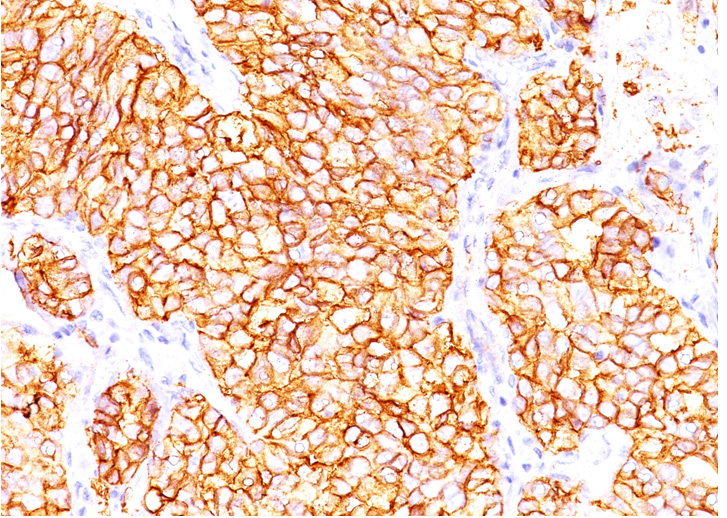Carbonic Anhydrase IX (CA9) Marker Mouse Monoclonal Antibody [Clone ID: 66.4.C2 (PN-15)]
CAT#: AM32835PU-S
Carbonic Anhydrase IX (CA9) Marker mouse monoclonal antibody, clone 66.4.C2 (PN-15), Purified
Size: 20 ug
Other products for "Carbonic Anhydrase IX"
Specifications
| Product Data | |
| Clone Name | 66.4.C2 (PN-15) |
| Applications | FC, IF, IHC, IP, WB |
| Recommended Dilution | ELISA: For Coating Use Antibody without BSA. Western Blot: 0.5-1 µg/ml. Immunoprecipitation: 1-2 µg/500 µg protein lysate. Flow Cytometry: 0.5-1 µgl/106 cells. Immunohistochemistry on Frozen and Formalin-Fixed Paraffin Sections: 0.5-1 µg/ml for 30 minutes at RT. Staining of formalin-fixed tissues requires boiling tissue sections in 10mM Citrate Buffer, pH 6.0, for 10-20 min followed by cooling at RT for 20 minutes. Positive Control: Normal kidney or renal cell carcinoma. |
| Reactivities | Equine, Human |
| Host | Mouse |
| Isotype | IgG2b |
| Clonality | Monoclonal |
| Immunogen | Microsomal fraction of Human renal cortical tissue homogenate |
| Specificity | Recognizes a glycoprotein of ~200kDa, identified as carbonic anhydrase IX (CAIX/gp200). Its epitope resides in the carbohydrate domain of gp200. It shows no significant cross-reactivity with other carbohydrate determinants, such as the Lewis blood group antigens, epithelial membrane antigen, HMFG, and AB blood group antigens. In normal kidney, gp200 is localized along the brush border of the pars convoluta and pars recta segments of the proximal tubule, as well as focally along the luminal surface of Bowman's capsule adjoining the outgoing proximal tubule. This Monoclonal antibody may be useful in the investigations of carcinomas of proximal nephrogenic differentiation especially those showing tubular differentiation. The renal cell carcinoma (RCC) monoclonal antibody marker, also known as RCC-ma, is a marker for renal cell carcinoma (reviewed in Ingold et al, 2008). The 66.4.C2 antibody has been used in antibody panels to help determine or rule out renal cell carcinoma. For example, a kidney mass removed from a neonate with suspected tuberous sclerosis complex was negative for renal cell carcinoma antibody staining and it was determined that renal cell carcinoma was not present (Murkami et al, 2012). In contrast, a kidney mass from a child was positive for renal cell carcinoma antibody staining and the mass was defined as a renal cell carcinoma (Chen et al, 2012). The actual protein recognized by RCC-ma antibody is a 200 kDa glycoprotein (gp200) expressed in renal epithelial cells. In normal tissue, the renal cell carcinoma/RCC-ma/gp200 antibody stains the brush border of proximal renal tubules in Human kidneys. Renal cell carcinoma antibody reactivity has been described in up to 93% of primary Human renal cell carcinomas and 84% of renal cell carcinoma metastases. The clone 66.4.C2 antibody has also been used to help make a diagnosis of renal cell carcinoma in a Horse with a mass of unknown origin (Swain et al, 2005). Gp200 is also expressed in some non-kidney tissues including breast tubules and ducts, the surface of epididymal tubular epithelia, and the colloid of thyroid follicles. However because of the reported high expression of gp200 in renal cell carcinoma, gp200 is most commonly referred to as Renal Cell Carcinoma Marker. There is considerable commentary regarding the antibody properties of the 66.4.C2 and other RCC-ma clones, including antibody staining patterns in renal cell carcinoma, other cancers, normal tissues, as well as using the antibody to discriminate between tumor types. Cellular Localization: Cell surface and cytoplasmic. |
| Formulation | 10mM PBS State: Purified State: Liquid purified IgG fraction from Bioreactor Concentrate Stabilizer: 0.05% BSA Preservative: 0.05% Sodium Azide |
| Concentration | lot specific |
| Purification | Protein A/G Chromatography |
| Conjugation | Unconjugated |
| Storage | Store undiluted at 2-8°C. |
| Stability | Shelf life: one year from despatch. |
| Predicted Protein Size | 200 kDa |
| Gene Name | carbonic anhydrase 9 |
| Database Link | |
| Background | Renal cell carcinoma (RCC) is a common form of kidney cancer that poses challenges for the pathologist (reviewed in Ingold et al, 2008). Firstly, renal cell carcinoma (RCC) may initially present as a metastatic lesion of an undetected primary tumor. Secondly, a late occurrence of renal cell carcinoma metastasis after nephrectomy can make it difficult to confirm renal origin. Thirdly, metastatic renal cell carcinoma has morphological similarities with various types of primary non-renal tumors thereby compounding typing challenges. In view of these issues, antibodies recognizing protein markers associated with a given cancer have become important tools for tumor classification. |
| Synonyms | Carbonic anhydrase 9, Carbonic anhydrase IX, Carbonate dehydratase IX, Membrane antigen MN, P54/58N, pMW1, CA9, CA IX, G250 |
| Reference Data | |
| Protein Families | Druggable Genome, Transmembrane |
| Protein Pathways | Nitrogen metabolism |
Documents
| Product Manuals |
| FAQs |
| SDS |
{0} Product Review(s)
0 Product Review(s)
Submit review
Be the first one to submit a review
Product Citations
*Delivery time may vary from web posted schedule. Occasional delays may occur due to unforeseen
complexities in the preparation of your product. International customers may expect an additional 1-2 weeks
in shipping.






























































































































































































































































 Germany
Germany
 Japan
Japan
 United Kingdom
United Kingdom
 China
China



